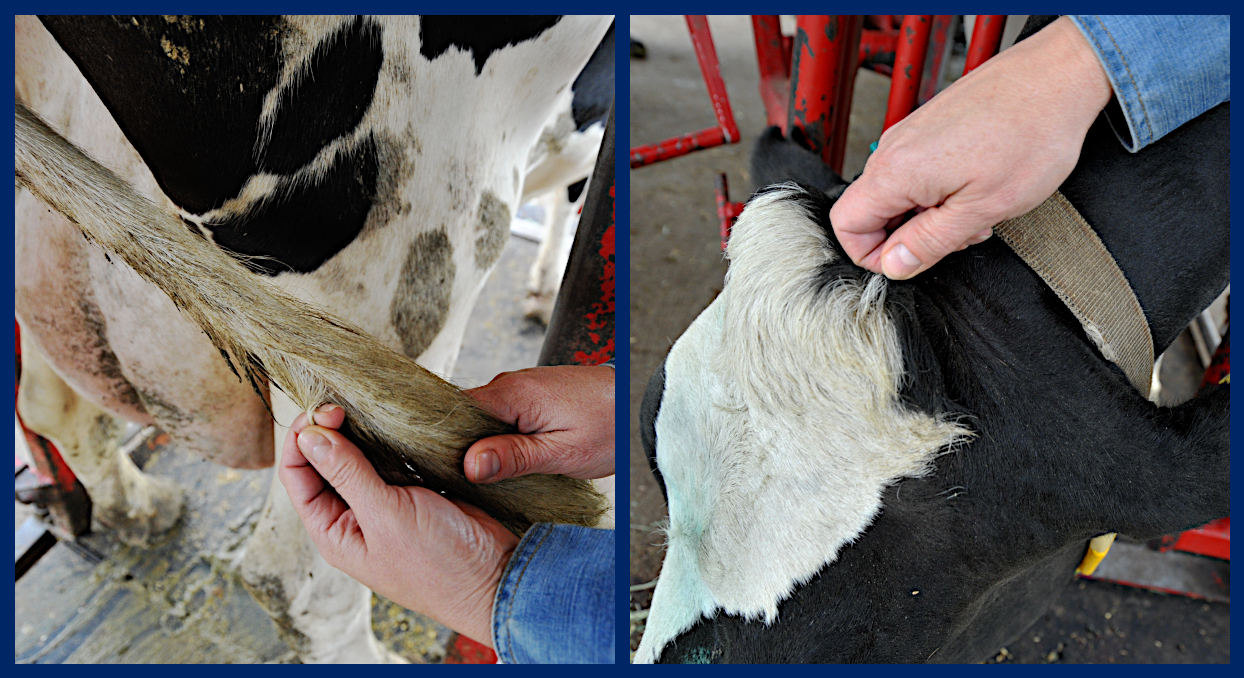Quick Summary
Click here for Price and Turnaround Time
Phenotype: Holsteins with the Dominant Red variant are red and white. This phenotype may appear visually similar to or even indistinguishable from the red and white coat produced by the Recessive Red MC1R variant.
Mode of Inheritance: Autosomal dominant
Alleles: N = No Dominant Red, DR= Dominant Red
Breeds appropriate for testing: Holstein, Holstein crosses
Explanation of Results:
- Cattle with N/N genotype do not have this Dominant Red variant, so their coloration is dependent on their MC1R genotype. They cannot transmit this Dominant Red variant to any of their offspring.
- Cattle with N/DR genotype will be red and white. They will transmit this Dominant Red variant to 50% of their offspring, and those offspring will have the Dominant Red phenotype.
- Cattle with DR/DR genotype will be red and white. All calves produced by these cattle are expected to be red and white regardless of the mate's genotype.
Sample Collection
Most of the cattle DNA tests offered by the VGL are carried out using cells from the roots of a hair sample (roughly 20-40 hairs).
Hair samples should be taken from the switch of the tail, the poll, or the neck.

1. Clean (use comb if possible) tail switch, poll, or neck by removing all loose hair and foreign matter.
2. Use fingers or pliers to grasp approximately 8-10 hairs close to the skin and pull. Pull (do NOT cut) hair strands. Examine the end of hair strands for presence of root bulbs. Hair roots are necessary for DNA testing. If the majority of hair strands lack the root bulbs, discard hair and start again.
3. Repeat until you have approximately 20-40 hairs with root follicles attached.
4. Place the 20-40 hairs with root follicles attached in the envelope and seal with the animal’s ID written on the envelope. If hairs are long they can be taped to the submission form. Do not tape the roots.

5. Repeat steps 1-4 for each additional animal being sampled.
Note:
- Hair should be dry.
- If hair has excess dirt and debris, please brush out if possible before pulling hairs for sample.
- Do not cut the hair! The roots contain the DNA for testing.
- When sampling several animals in the same session, make sure that there are no hair strands in your hands to reduce the possibility of sample contamination. Clean hands and/or pliers if possible.
Dominant Red, as the name implies, is a dominant red color that occurs in Holstein cattle. The Dominant Red gene is independent from MC1R, a major gene controlling black and red color in Holstein. Dominant Red color is increasing in popularity among breeders. The mutation that causes Dominant Red has been identified by a team of researchers from the US, Canada, and Sweden.
Testing for Dominant Red allows breeders to identify homozygous animals (animals with 2 copies of the variant) which will always produce red and white offspring. The Dominant Red test is also useful in determining if an animal is red due to both MC1R and Dominant Red.
Other Holstein breed-specific tests offered by the VGL:
